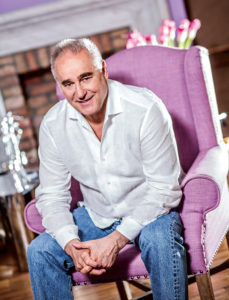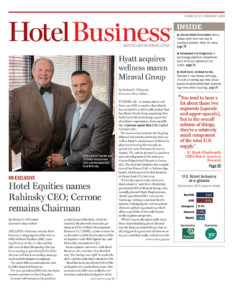Henry Kallan, president of the Library Hotel Collection, immigrated to the U.S. in 1968 at the age of 21. A native of the former Czechoslovakia, Kallan worked his way up from bus boy to become one of the most well-known names in the boutique sector. Today, the Library Hotel Collection comprises four hotels in New York City and two in Europe, with another, Hotel X Toronto, set to open this year. The 404-key urban resort will offer—in addition to the usual amenities provided by luxury resorts—a 90,000-sq.-ft. athletic facility with indoor tennis courts, squash courts, a golf simulator, a spinning studio and more. Here, Kallan reflects on his hospitality career, the boutique segment and the company’s aspirations.
When did you know you wanted to have a career in hospitality? My passion for the hotel business started while I was a teenager working at a hotel in Bratislava. I quickly learned that making guests feel comfortable was a valuable skill that I have refined over the years. While my role has changed, my principles have remained the same, which is to provide value and enjoyment to all guests.
How would you describe your hospitality career trajectory? What were the major lessons you learned along the way? My first hotel job in New York City was at The Gotham Hotel (the current Peninsula Hotel) as a bus boy. Since I was still learning English, this was a great opportunity for me to get my foot in the door. My supervisor there was unfair and unhelpful. I will never forget how that felt. That life lesson stays with me today, and I am driven to be helpful toward people and give them opportunities.
From The Gotham, I moved to the Plaza Hotel where I offered to work for free for two weeks at the front desk to show the leadership team my passion and desire to be part of the hospitality industry. I was successful in this position and over the next few years I held management positions at The Pierre, Delmonico’s, Loews Summit Hotel (my first assistant GM position) and eventually returned to The Gotham as the general manager at the young age of 28. Two years later, Loews Hotels contacted me once again and offered me the general manager position at the Warwick Hotel. This quickly led to my next position, which was in development; I worked with Warwick Hotels and Resorts to build new luxury hotels and resorts around the world for its portfolio. I realized I had the skill and talent to do this all on my own, which led to acquiring my first hotel. I acquired the dilapidated Hotel Wales on the Upper East Side, which I developed into the first boutique hotel in New York City.
Hotel Wales was the first of its kind and offered the best value in the city. This was also the first time I introduced our signature concept of a beautiful rooftop garden and all-day clubroom where we offer free breakfast as well as wine and hors d’oeuvres receptions. I sold my interests in the property in early 1990 to pursue the purchase and restoration of Hotel Elysee, followed by the Casablanca Hotel in 1996; Hotel Giraffe in 1999; and the Library Hotel in 2000, all in New York. The brand expanded with our first international project in 2003 with Aria Hotel Prague, and we opened Aria Hotel Budapest in 2015. We will also welcome Hotel X Toronto to the collection in 2017.
Why did you pursue the boutique segment? I think big hotels are not able to offer personalized service and provide the personal attention guests really look for to make them feel welcome and appreciated. At the same time, it allows me, as an owner, to have the flexibility to promote my vision, which is not only the architectural and aesthetic value, but also the functionality and comfort that guests look for as if they would be staying in their own home.
What do you think is the secret to your success? I tend to think I am a happy and positive individual, and I try to create a happy environment for my employees and guests. I encourage staff to be free, to be themselves and empower them to make the right decisions for the benefit of both the guests and the hotel.
What’s your philosophy when it comes to hospitality? My philosophy is to make the guest happy no matter what it takes. We are in the business to please and to create an experience for them. This is why we all love to travel—for the experiences.
How have you seen the New York hotel market change over the years? What do you expect from the future? The market is always evolving. There are always new hotels coming online, and recently we have seen the entrance and growth of Airbnb. As a result, a greater inventory, regardless of the quality of the product, dilutes the occupancy and drags down RevPAR. To keep up with the market, you need to stay true to your core value and provide guests with the best experience.
The company is expanding into Canada. Why did you focus on Toronto? The opportunity to create a nine-acre, urban lakefront resort in the downtown location of any major city in North America simply does not exist.
Tell me a little bit about the property. What will set this hotel apart from its competitors? Eighty percent of the rooms have magical views of Lake Ontario including the public areas, which include a three-level rooftop that can accommodate up to 500 people at any given time. No hotel in Toronto offers or provides the sports facilities that we will, including year-round indoor tennis and squash courts, etc. All of this is situated in a private garden setting.
This is a bit of a departure for you, as it’s not a boutique hotel. Is there anything different about how you’re approaching this project? The difference in approaching such a large-scale project like Hotel X Toronto is our ability to provide the same feeling, service and experiences that we offer in our smaller boutique properties.
Are there any other major targets or goals for the future you can share? My goal for the Library Hotel Collection is to continue expanding in new markets such as London, Europe and Southern California. HB


